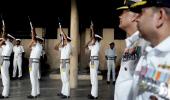'Surgical strikes or air strikes, or both, are likely on the table.'

"Any strike would be a small component of a broader and multifaceted Indian response in the coming days and weeks. There will likely be an upsurge in covert activities, but we can also expect non-military punitive steps," predicts Washington-based South Asia expert Michael Kugelman.
"If the goal is to degrade cross-border terrorism, that suggests that some type of limited kinetic action across the border is most likely," Dr Kugelman tells Rediff's Archana Masih in the first of a two-part interview.
Why has the Pakistan military establishment embarked on something horrific and provocative as the Pahalgam attack?
We know that Pakistan's establishment has historically sponsored militancy in Kashmir, as well as groups like LeT (Lashkar e Tayiba) and JeM (Jaish e Mohamad). But we don't yet know the extent of its involvement in the Pahalgam attack.
That said, what would the establishment get out of sponsoring an attack like this? There would be some immediate benefits.
If there is an expectation that an attack like this would provoke an Indian military retaliation, then the military could benefit from a rally-around-the flag effect, with the hope that the country would unite around it in the face of an Indian strike.
Given that the Pakistani military is not very popular at home these days, this would be no small matter. Not to mention, that the military uses the India factor as a pretext to justify its outsized role in policy and statecraft, and as a legitimising factor more broadly.
In that sense, if there is an attack, Pakistan denies involvement, and then positions itself as the guarantor of Pakistan's safety in the face of a strike from India, then the military can essentially bolster its legitimacy in the eyes of a public that has been harshly critical of the military in recent years.
But the benefits would end there. The last thing Pakistan needs is another confrontation, or worse a conflict, with India at a moment when it's dealing with three simultaneous crises: Political paralysis, economic stress, and upsurges in terrorism.
A national security crisis at home may unite the country and ease the second crisis. But it could also distract from economic reforms and provide something for terrorists to exploit, thereby exacerbating the first and third crises.
India had retaliated with surgical strikes after the attack on the army camp in Uri in September 2016, and with air strikes into Pakistan after the Pulwama terror attack in 2019. What punitive action is it likely to take after this worst attack against civilians since 26/11?
Surgical strikes or air strikes, or both, are likely on the table.
If the goal is to degrade cross-border terrorism, that suggests that some type of limited kinetic action across the border is most likely -- presumably in PoK (Pakistan occupied Kashmir), but perhaps in Khyber Pakhtunkhwa, as we saw in Balakot in 2019.
Any operation along these lines, however, would not necessarily come anytime soon.
There's also something to say for delaying military action, as this would maintain an element of surprise and keep Pakistan anxious.
My sense, however, is that any strikes would be a small component of a broader and multifaceted response in the coming days and weeks. There will likely be an upsurge in covert activities.
But we can also expect non-military punitive steps, going beyond the diplomatic measures taken immediately after the attack. I anticipate India taking full advantage of suspending the Indus Waters Treaty, and signalling plans to build new dams.
It may try to put the squeeze on Pakistan by pressing its donors -- most of whom also have good ties with New Delhi -- to cut off funding.
I imagine it will also push FATF members to begin a process to get Pakistan back on the grey list.
America has condemned the Pahalgam attack and said that it stands with India, but has not explicitly criticised Pakistan.
What assistance could India expect from the United States in keeping with the existing security agreements between the two nations?
The US and India are close partners but not formal allies, so there are no binding security commitments. That said, one area where the US will likely want to help is with tracking down the terrorists that staged the attack.
The US-India security relationship has deepened to the point where there is sufficient trust to allow for intelligence-sharing (one of the most publicly known examples is the US supplying intel to India in 2022 that helped it pre-empt a Chinese incursion on the LAC).
So the US will likely want to share any intelligence with India that helps pin down the movements and locations of the attackers.
Beyond that, the US will likely double down on longstanding efforts to pressure Pakistan to cooperate in investigations and judicial processes tied to past cross-border attacks, especially the 2008 Mumbai attacks.
India may view the US-Pakistan security partnership, limited though it is, as a problem. But it does give Washington an opportunity to push Islamabad to do more on this front.
It's a message the US may deliver next month when the next round of the US-Pakistan counterterrorism dialogue is expected to convene.










